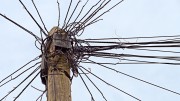How would you feel if you had to pay extra money to get your internet to load faster, or to visit certain websites? How about not being able to watch videos on YouTube or Stumble Upon? All this could be taken away if net neutrality isn’t fought for.
Net neutrality is what allows us to surf the internet. It lets us control anything we watch, see, or do on the World Wide Web. Major companies that control our phone service and internet access, such as Verizon and Comcast, want to take this right away from us.
“Net neutrality is crucial to the free flow of information in a democratic society,” says communications professor Dr. Robert Trader. “The risk is that Internet Service Providers could restrict access or even deny access to certain websites or types of content among all or select users.”
At its heart, net neutrality is an internet provider’s impartiality to the source of information. Without net neutrality, we could not watch videos that the internet provider feels are controversial. The company would basically just give special treatment to the information on the web they feel everyone should see and censor what they feel everyone shouldn’t see, given that they can also select who can and can’t see the information.
“It takes all the freedom from the individual and gives too much power to the corporations,” said sophomore Kiera Gillock, who heard about net neutrality on multiple radio shows. “I do not agree with censorship, and I think that passing any bill limiting the freedom of the internet anymore than it is now would be censoring the general public.”
According to Dr. Trader, companies such as Netflix and Amazon Cloud are offering on-demand streaming of media. Because of this, people are spending more time on the internet and causing more bandwidth to be eaten up.
The Federal Communications Commission (FCC) is our only hope for help in the fight to preserve net neutrality and freedom of speech. The FCC is ready to fight those in congress who want to reverse the laws that have already been put into action in order to keep net neutrality.
“It’s just another way for the most powerful companies to gain even more money and control, said freshman Erin Farr, “The internet is public domain; control of it needs to remain to the public.”
A temporary solution was approved by the FCC on Dec. 21, 2010. Basically, the FCC compromised to create two types of internet, one for fixed line providers and another for the companies that provide wireless services.
“Net neutrality is not as neutral as the title would lead us to believe; it needs to be rewritten, or preferably, dropped all together in favor the complete freedom of the internet,” says Gillock.
To learn more about net neutrality or if you would like to have your voice heard, visit http://www.savetheinternet.com/.



